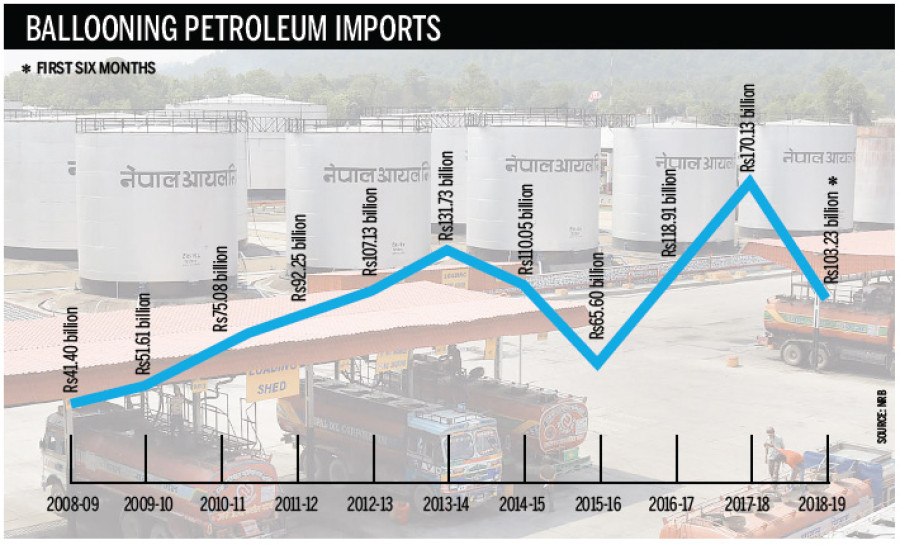Money
Nepal blew Rs103b on fuel in first six months
Nepal blew Rs103 billion on fuel imports in the first six months of the current fiscal year, despite regular power supply to households and industries.
Nepal blew Rs103 billion on fuel imports in the first six months of the current fiscal year, despite regular power supply to households and industries.
According to Nepal Rastra Bank’s macroeconomic report, the country’s fuel import bill surged 50.4 percent year-on-year during the period mid-July to mid-January, raising alarms that total import expenses may reach a staggering Rs200 billion if the same trend continues.
Oil imports have swelled even though the Nepal Electricity Authority has declared an end to load-shedding which was expected to result in a sharp fall in cooking gas imports. In April 2018, the state-owned power utility declared industrial areas free from power cuts, but this has not resulted in a drop in the import of petroleum products.
Fuel imports hit a peak of Rs131.73 billion in 2013-14. Shipments dried up to a trickle following the Indian trade embargo in 2015. In fiscal 2015-16, fuel imports plunged to a seven-year low of Rs65.6 billion. Officials attributed the jump in imports to increased infrastructure development projects in the country. In the last fiscal year 2017-18, Nepal’s oil import bill amounted to Rs170 billion.
In the first six months of the current fiscal year, fuel imports made up more than 22 percent of the country’s total import spending to become the main reason for the yawning trade deficit. Nepal Oil Corporation said that the increase in fuel imports was due to increased construction work and a depreciation of the Nepali rupee against the US dollar. Petroleum prices in the international market swelled to $86 per barrel in October from $65 per barrel in July. The exchange rate of the dollar also rose to Rs119.33 from Rs109.94. “In addition, there is a significant rise in the import volume due to soaring demand for petroleum products from development projects,” said Binit Mani Upadhyaya, deputy director at the oil corporation.
Nepal Oil Corporation also blamed gasoline smuggling to India for the sharp rise in imports. Fuel costs more south of the border, and locals make endless trips to exploit the price differential. Two months ago, petrol was Rs20.97 cheaper per litre and diesel was Rs23.73 cheaper per litre in Nepal than in India.
“As a result, a large number of Indian motorists cross the border into Nepal to fill up their tanks, and they make several round trips a day,” said Upadhyaya, adding that the smuggling had been checked in the last two months. “At present, the price differential is only around Rs5 per litre in the border markets.”
According to the state-owned oil monopoly’s annual statistics, fuel imports rose around 20 percent in the last fiscal year. Petrol imports rose 20 percent to 484,781 kilolitres, diesel imports went up 23 percent to 1,597,551 kilolitres while aviation fuel imports increased 18 percent to 370,560 tonnes in 2017-18, the company said.




 13.12°C Kathmandu
13.12°C Kathmandu












